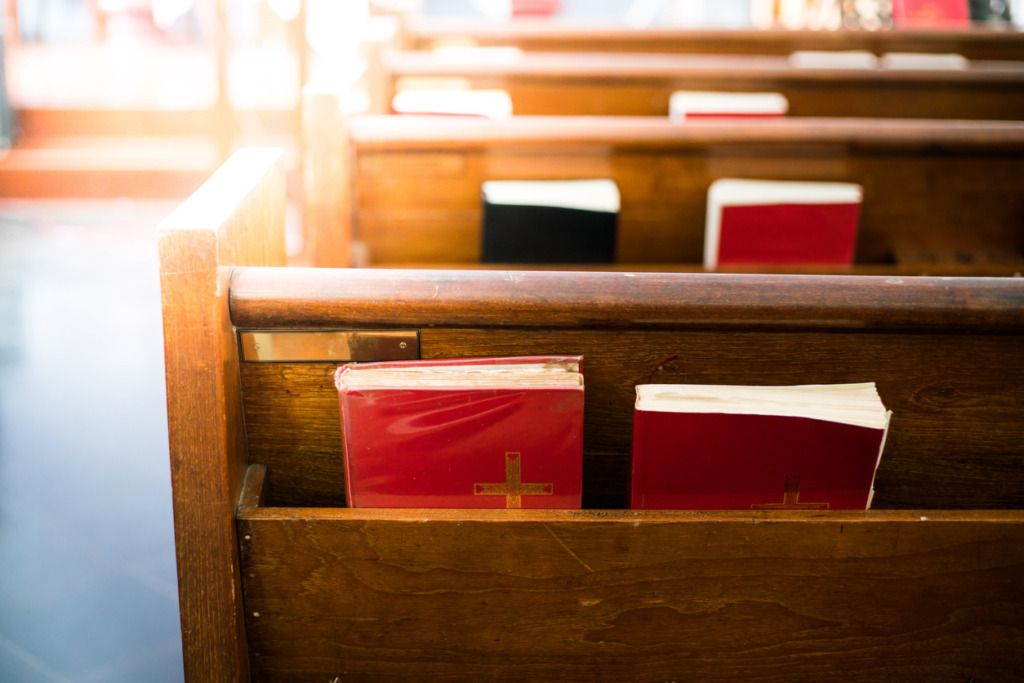Question:
When I was at Mass yesterday, the congregation sang a rousing rendition of “God Bless America.” That brought to my mind the flag issue. I have been in many Catholic churches of late — especially for funerals — and I have not seen a single flag. What is the Catholic Church’s stand on American flags in the sanctuary? (Niskayuna, New York)
Answer:
Some might be surprised to know that there are currently no regulations regarding the display of national flags in churches — neither in the Church’s Code of Canon Law nor in the books that govern the celebration of the liturgy. That matter is left to the judgment of the diocesan bishop who often, in turn, delegates the decision to the local pastor.
Under the heading of prayer and worship, the U.S. national bishops’ conference does say on its website:
“The bishops’ Committee on the Liturgy has in the past encouraged pastors not to place the flag within the sanctuary itself, in order to reserve that space for the altar, the ambo, the presidential chair and the tabernacle. Instead, the suggestion has been made that the American flag be placed outside the sanctuary, or in the vestibule of the church.”
Question:
Why has the Catholic Church not condemned boxing? It is the only sport in the world whose purpose is to hurt your opponent, even to knock him out. People in other sports get hurt, but the purpose is not evil. The goal is to get a home run or a basket or a touchdown.
Boxing is a barbaric sport where the participants try to pummel their opponent into oblivion. It certainly doesn’t belong in a civilized society whose rules are based on divine law. (Little Rock, Arkansas)
Answer:
I agree with you completely and, while the Church has no “official” position on boxing, Catholic theologians have long questioned the morality of professional prizefight- ing.
Back in 2005, La Civiltà Cattolica, in an article titled, “The Immorality of Professional Prizefighting,” called the sport a “legalized form of attempted murder” and noted that fighters who don’t die in the ring often suffer long-term physical and psychological injuries.
The particular significance is that this journal reflects the official view of the Vatican and that its articles are preapproved by the Vatican’s Secretariat of State. “From a moral point of view,” said the article, “the judgment of boxing can only be gravely and absolutely negative.”
More recently, in August 2021, Father Tadeusz Pacholczyk authored an article that ran in The Catholic Spirit, the official newspaper of the St. Paul and Minneapolis archdiocese. Father Pacholczyk, who holds a doctorate in neurosciences from Yale University and serves as director of education at the National Catholic Bioethics Center in Philadelphia, wrote:
“If the goal of a professional boxing match is ‘just’ to knock out the opponent to gain victory, the purpose of the competition itself still raises moral concerns, because participants are striving to inflict potentially serious harm to their opponent’s brain by causing a concussion, a type of traumatic brain injury.”
He also noted that “the sport of boxing not only risks serious impairment and even death, but poses many uncomfortable questions for us regard- ing our own appetites as spectators, and our willingness to allow for certain elements of brutality and even barbarism in the practice of sporting events.”
Question:
For more than 10 years, a member of my parish has been disrupting Mass on a regular basis. She will sit in the pew rocking back and forth, throwing her arms toward heaven and calling out in a loud voice — sometimes “Papa” and sometimes just a guttural scream.
At Communion time, she will sometimes come up to the altar before anyone else has been directed to leave the pews. She has a faraway look in her eyes and physically resists if anyone tries to have her move on.
Our current pastor has told her that she is no longer welcome, so she now waits until he has begun Mass before appearing and taking her place. What can we as a parish church do? (Richmond)
Answer:
The first step, of course, would be for your pastor to take the woman aside and have a quiet conversation with her. This conversation would highlight the fact that, in fairness to other parishioners, a church needs to be a quiet place where people can pray peacefully. I am going to assume that your pastor has already tried this approach without success.
Some dioceses have written policies for approaching such situations. The Diocese of Stockton in California, for example, says on its website that “in the event that an individual should cause a disturbance during the liturgy, it is the responsibility of the usher(s) to escort the individual outside the church if the individual is willing to go. Otherwise, the usher should call the police and ask that the individual be removed from private property.”
It’s important to know that churches are private property and Church officials are entitled to extend or withdraw the invitation to enter their premises as they see fit. Simply because a church’s services are open to the public does not mean that a parish is legally bound to admit someone who disrupts those services.
Involving the police seems the wisest and safest approach, especially since in many jurisdictions law enforcement is allowed not only to remove such individuals but to bring them to a local hospital for evaluation.

